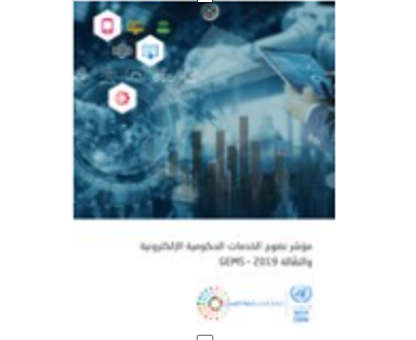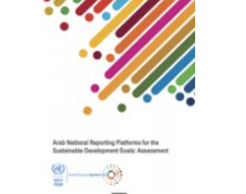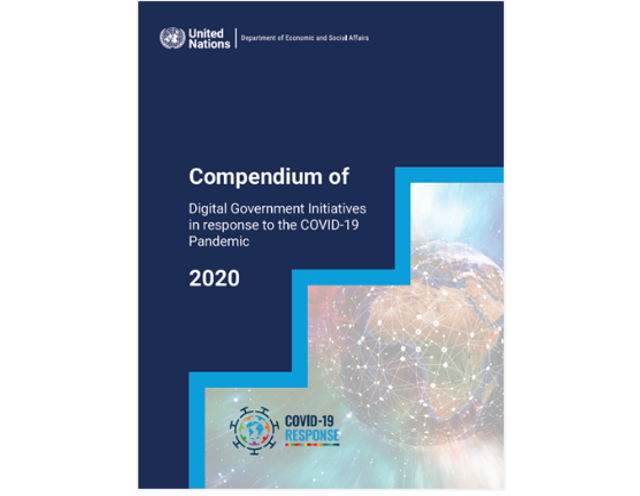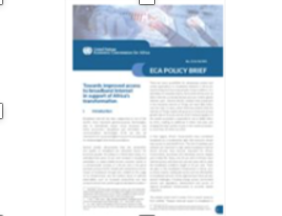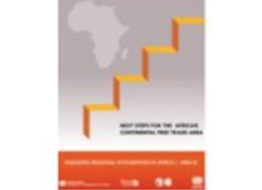Resources
Displaying 1 - 12 of 16
E-government Survey 2022: The Future of Digital Government
| English | Digital Government | Global | Publication | UN DESA/DPIDG
The UN E-Government Survey 2022 was launched on 28 September 2022. The theme of the 12th edition of the Survey is “The Future of Digital Government”. The Survey looks at how digital government can facilitate integrated policies and services across the 193 United Nations Member States. It supports countries’ efforts to provide effective, accountable and inclusive digital services to all and to bridge the digital divide and leave no one behind.…
Expert Discussion on Data Policy Issues
| English | Russian | Digital Government | Europe and Central Asia | Webinar | IIS
A panel discussion on data policy will be held on 24 November 2020. The meeting is being held by the World Bank in conjunction with the National Center for Digital Economy of Lomonosov Moscow State University and the Institute for the Development of the Information Society.
In the period from 2019 to 2020, the World Bank, in collaboration with representatives of government authorities, the scientific and educational community and the private…
Internet Governance Forum 2020
| English | Digital Government | Global | Event | UN DESA/DPIDG
Internet governance was one of the most controversial issues at the World Summit on the Information Society (WSIS) and at the subsequent WSIS+10 review by the General Assembly in the wake of the adoption of the Sustainable Development Goals (SDGs) in 2015. Cognizant of the fact that any Internet governance approach should be inclusive and responsive, the WSIS mandated the Secretary-General of the United Nations to convene the Global Internet…
Government Electronic and Mobile Services (GEMS) Maturity
| English | Digital Government | Middle East | Publication | ESCWA
GEMS indicator aims to measure the maturity of government services provided through the portal and through mobile applications in the Arab region. It seeks to bridge the gap in most of the international indicators, related to service maturity, its use and user satisfaction. To this end, 84 government services have been identified, and it is necessary for each country to deliver them electronically for individuals and businesses. The principle of…
Arab National Reporting Platforms for the Sustainable Development Goals: Assessment
| English | Digital Government | Middle East | Publication | ESCWA
SDGs National Reporting Platforms (NRPs) are essential to help member countries to achieve their national development goals and are crucial elements to monitor and report the progress towards achieving the SDGs at all levels. The objective of these platforms is to create sustainable pathways for sharing transparent information, offering easy analysis tools that enable Governments and policymakers set, evaluate their progress, and adjust…
Building the Arab Digital Economy – A Strategy Blueprint
| English | Digital Government | Middle East | Publication | ESCWA
Over the past decade, global economic growth rates have continuously declined. The extent of this trend, influenced by developments in digital technologies, are yet to be fully captured. Today, numerous national efforts are deemed to be largely ineffective in terms of their responsiveness to new and emerging social, economic and political landscapes. What are the strategic directions and policy roadmaps for a thriving digital economy that spans…
Integrating Transparency, Accountability and Anti-Corruption in Socio-Economic Impact Analyses
| English | Digital Government | Africa | Policy Brief | ECA
The COVID-19 pandemic has brought chaos, uncertainty and supply chain disruptions to the global economy, impacted lives and livelihoods, and tested the resilience of governance systems, institutions and mechanisms in responding to the crisis. As the technical lead for the socio-economic response to the COVID-19 pandemic in the UN system, UNDP and its Country Offices worldwide are working to assess the socio-economic impacts of the COVID-19…
Compendium of Digital Government Initiatives in Response to the COVID-19 Pandemic
| English | Digital Government | Global | Publication | UN DESA/DPIDG
This compendium, prepared by the Division for Public Institutions and Digital Government (DPIDG) of the United Nations Department of Economic and Social Affairs (UN DESA), aims to capture emerging trends in digital responses of UN Member States against the COVID-19 pandemic, and provide a preliminary analysis of their main features. These cases are shared for exchange of information so that Member States can learn from each other and possibly…
Capacity Development Webinar on Leveraging Digital Government & Spearheading Innovative Digital Solutions to Address the COVID-19
| English | Digital Government | Global | Webinar | UN DESA/DPIDG
Governments across the Caribbean have been severely impacted by the COVID-19 pandemic, due to their high economic dependence on travel and tourism, which have virtually collapsed as a result of border closures and restrictions. In the context of already high public debt levels and an even more limited fiscal space following the pandemic, Caribbean governments are endeavoring to strengthen public health interventions while limiting the impact of…
Towards Improved Access to Broadband Internet in Support of Africa’s Transformation
| English | Digital Government | Africa | Policy Brief | ECA
North African economies are characterized by slow economic diversification and persistent unemployment, especially among educated youth. Labour productivity has registered only a moderate increase compared with more dynamic emerging countries like India or Turkey. These patterns share a common origin, which lies in the existence of many distortions in the economy that prevent an efficient allocation of resources between firms and sectors. These…
Regional Conversation Series on Building Back Better: Accelerating Digital Connectivity and Leveraging Innovation
| English | Digital Government | Asia and the Pacific | Webinar | ESCAP
Asia and the Pacific is a key driver of a technological revolution that is profoundly transforming the way we live, work and relate to one another. At the same time, the region is also one of the most digitally divided, with less than 14 per cent of the population connected to affordable and reliable high-speed Internet. Around 52 per cent of the region’s population remains offline. As the COVID-19 new normal has seen our reliance on…
Assessing Regional Integration in Africa - ARIA IX
| English | Digital Government | Africa | Publication | ECA
Signed by 52 African countries, the African Continental Free Trade Area (AfCFTA) is, by the number of participating countries, the largest trade agreement since the formation of the WTO. By 1 April 2019, only one year and ten days after the signature, the threshold of ratification by 22 countries required for the agreement’s entry into force had been reached. The speed of this ratification is unprecedented in African Union history.
With so…
 Добро пожаловать в ООН!
Добро пожаловать в ООН!



